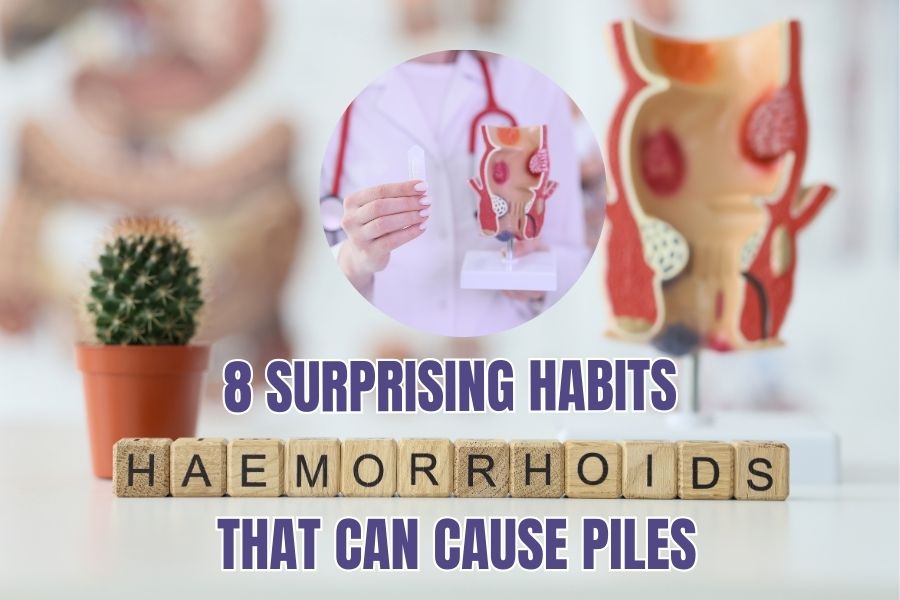8 Harmless Habits you didn’t know can Cause Piles

Piles, also known as hemorrhoids, are a common condition that many people suffer from. They are swollen veins in the rectal area that can cause pain, itching, and discomfort. While many associate piles with certain medical conditions or lifestyle factors, you may be surprised to learn that some of your everyday habits, seemingly harmless, can increase your chances of developing piles. Here are the eight harmless habits that could lead to piles.
1. Sitting for Long Periods
Sitting for long stretches without standing up can put unnecessary pressure on the veins in your rectal area. This is especially true if you sit on hard surfaces or have poor posture. Over time, this pressure can contribute to the development of piles. Whether you work at a desk or spend a lot of time in front of the TV, it’s important to take regular breaks to stand up and move around.
2. Straining During Bowel Movements
One of the most common causes of piles is straining during bowel movements. This usually happens when you’re constipated, but it can also be the result of trying to rush the process. The excessive pressure you exert during straining puts stress on the blood vessels in your lower rectum, causing them to swell and potentially leading to piles. Eating a high-fiber diet and staying hydrated can help avoid this problem.
3. Not Drinking Enough Water
Dehydration can lead to harder stools, which make bowel movements more difficult and painful. Hard stools can cause you to strain more, putting pressure on the rectal veins and increasing the likelihood of developing piles. Drinking enough water helps keep your stools soft, making bowel movements easier and reducing the risk of piles.
4. Skipping Fiber-Rich Foods
A diet low in fiber is another significant contributor to constipation and piles. Fiber is essential for keeping your digestive system functioning smoothly, as it adds bulk to your stool and makes it easier to pass. People who don’t consume enough fiber are more likely to suffer from constipation, which in turn increases the risk of straining during bowel movements and developing piles. Incorporating more fruits, vegetables, whole grains, and legumes into your diet can greatly reduce this risk.
5. Frequent Heavy Lifting
Heavy lifting, whether in the gym or during manual labor, can increase abdominal pressure and strain the veins in the rectal area. Over time, repeated heavy lifting can cause or aggravate piles. If you must lift heavy objects, make sure to do so properly by bending at the knees and keeping your back straight, reducing strain on the lower abdomen.
6. Ignoring the Urge to Go
Delaying bowel movements when you feel the urge can lead to harder stools and increased straining later on. Ignoring the body’s natural signals can disrupt your bowel routine and put more pressure on the rectal veins when you finally go. It’s important to listen to your body and visit the restroom as soon as you feel the need.
7. Prolonged Use of Laxatives
While laxatives can be helpful for occasional constipation, relying on them too frequently can weaken the bowel muscles and interfere with normal bowel movements. Overuse can also lead to diarrhea, which irritates the rectal area and can increase the risk of piles. Instead of turning to laxatives regularly, try increasing your fiber intake and staying hydrated to promote regular, natural bowel movements.
8. Excessive Coughing or Sneezing
Chronic coughing or excessive sneezing, particularly when it’s forceful, can put pressure on your abdominal muscles and rectal veins. This repeated strain can increase the chances of developing piles over time. If you have a persistent cough or suffer from allergies that cause excessive sneezing, consider seeking medical advice to manage the underlying issue and reduce your risk of piles.
While piles are often associated with certain medical conditions or lifestyle factors, it’s surprising how common and seemingly harmless habits can contribute to the development of this condition. By making small changes in your routine—such as staying hydrated, incorporating more fiber into your diet, and avoiding prolonged sitting—you can reduce your risk of piles and improve your overall digestive health.If you’re experiencing symptoms of piles or think you may be at risk, don’t hesitate to seek professional advice. Dr. Bhavesh Doshi, a leading piles specialist in Mumbai, can provide expert diagnosis and treatment to help you manage the condition and improve your quality of life. Schedule an appointment with Dr. Bhavesh Doshi today and take the first step towards effective relief from piles.



